Japan's Official Development Assistance White Paper 2007
Column 13 Senior Volunteers
The Senior Volunteers Program dispatches men and women between the ages of 40 and 69 who possess a wide range of skills and experiences to developing countries. Due to the growing number of senior citizens interested in volunteering, the program has been attracting more attention in recent years. Since 1996, this program has dispatched 3,030 people to 57 countries (1,212 volunteers in FY2006 including newly dispatched volunteers and continued ones from previous years).
What's Necessary for Developing Jordan's ICT Industry
Fukuhiko Noma
(Training Subject: System Engineering)
Fukuhiko Noma applied to be a Senior Volunteer because he had been a software engineer for many years and wanted to make use of his experiences abroad. From April 2001 to March 2003, he was dispatched to provide job training in the Specialized Training Institute (STIMI) in Jordan's capital Amman, the organization which Vocational Training Corporation (VTC) oversees. He returned to Japan once, then in October of the same year to the end of April 2006, he was dispatched to Al-Balqa' Applied University in Sarto, a city near Amman. There he gave guidance on software development and creation.
Jordan is a country in the Middle East but produces no oil. For this reason, the Information and Communication Technology (ICT) sector is expected to grow and serve as the country's key industry. Jordan's software creation technology is at an overall high level, and many students aspire to work in ICT-related companies. However, some incidents made me feel that Jordan's ICT-related companies did not pay attention to customer satisfaction. For example when there was a problem with the provider's servers, despite causing inconvenience for everyone involved, there is no explanation whatsoever from the company to the clients. "Once you get the client, the rest is somebody else's problem." This seems to be the current situation with customer service in Jordan.
Once I understood this, it seemed necessary to explain the client-oriented way to students in Jordan who would be responsible for the ICT sector in the future. To be more specific, it is the concept of Quality, Cost, and Delivery (QCD), which is taken for granted in Japan, about creating products of high quality and low cost to meet the delivery date. The software market in Jordan is small, and without business exchanges abroad, neither management nor technology can be gained. I sensed there was a need to increase the capacity for software development that involves QCD, and it shows the importance of building international competitiveness. However, the truth is that even if such abstract concepts could be transferred, it seemed that giving lectures was not enough. In order to reach the level of "practice," it was necessary to participate in on-the-job training (OJT) on site.
Fortunately, I was able to get to know willing professors, students, and software engineers through lectures at universities and companies. Since returning home, I consulted the company where I work and invited some of the people I met in Jordan to come and study the development process through OJT. The QCD concept they learned will influence Jordan's ICT sector. The goal is to build a business relationship that will receive orders from Japan and build software in Jordan.
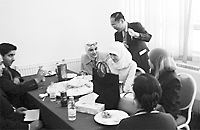
After the graduating thesis presentations at Al-Balqa' Applied University, Noma threw a party with the students. Many women are also students at the university. Noma is in back right. (Photo: Fukuhiko Noma)
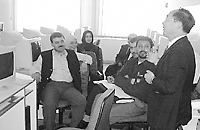
Noma giving a lecture for the faculty at the Al-Balqa' Applied University (Photo: Fukuhiko Noma)
Towards the First ISO Certification in the Dominican Republic's Government
Kazuhisa Sawase
(Training Subject: Quality Control)
From April 2004 until October 2006, Kazuhisa Sawase was dispatched to the Instituto Nacional de Formacion Tecnico Profesional (INFOTEP) in Santo Domingo, the capital of the Dominican Republic. As a qualified ISO quality inspector, Mr. Sawase went to provide guidance on attaining ISO certification. Sawase has experience in the railroad construction sector as a JICA specialist. Many years ago, he thought that if he had the skills, spirit, and physical health when he was older, he would want to become a Senior Volunteer.
With the Free Trade Agreement between the United States and five Central American countries and the Dominican Republic coming into effect, raising productivity and enhancing the competitiveness of domestic businesses are becoming important factors in the maintenance of economic growth*1 in the Dominican Republic. In light of this situation, INFOTEP, which is an organization that focuses on job training and business consulting. recognizes the importance of "quality" as the basis for developing the country's industry. As a first step, INFOTEP planned to obtain its own ISO9001:2000 certification,*2 the world's common standard for quality control.
In the beginning, the INFOTEP workers always said, "I don't know, I can't do it, I have no experience." Hearing this constantly, I even thought that if the plan couldn't be achieved, I would create the necessary documents for certification all by myself. However, that would have been a great deal of work bearing little fruit. I realized that it would be best to aim for the effective use of the INFOTEP workers. I decided to realize this plan by increasing their own capacity and willingness by motivating them and providing detailed guidance.
I tried to raise awareness using different tactics. I suggested that the human resources department create work procedures and holding seminars on internal audits in. I also requested that the public relations department run campaigns and issue an ISO public relations magazine. Through the creation of work procedures and a quality manual, I assigned each person specific roles. Setting a deadline, I basically let them work as they saw fit. I provided materials during that time, and helped each person. I patiently listened to their grievances, and constantly spurred them on. At the bi-weekly meeting for the quality management system's strategic committee, I explained the progress for the entire plan and gave pep talks on the creation of materials, to the point that the chief administrator called me a "noisy Japanese."
Perhaps owing to my "noisy" guidance, in November 2005, INFOTEP was able to obtain certification in 10 months, rather than the two and a half years it usually takes in this country. When we were notified about the certification, the workers and I set off fireworks together in front of the main gate and, enraptured by the music of meringue,*3 we had a heady sense of confidence and pride.
In this way INFOTEP become the first agency of the Dominican Republic's government requiring ISO certification. Now the Dominican Republic is trying to expand attainment of ISO certification to guidance pilot schools. In addition, the country is working to establish a domestic ISO certifying institution. INFOTEP is expected to act as the core, the Dominican Republic is steadily broadening their approach to address "quality" improvement.
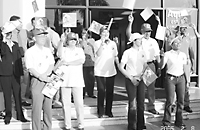
ISO Certification Campaign in the northern office located in the Dominican Republic's second largest city of Santiago. Sawase is front row right (Photo: Kazuhisa Sawase)
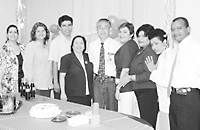
A surprise party took place to celebrate the birthday of Sawase, who was able to take some time out of his usually busy schedule to relax. He thanked everyone for their kindness (Photo: Kazuhisa Sawase)
Promoting a Patient-centered Mentality at a Hospital in Ghana
Kosaku Nagata
(Training Subject: Healthcare and Medical Treatment)
Starting in April 2005, Kosaku Nagata was dispatched for two years to the Komfo Anokye Teaching Hospital (1,000 beds), located in Ghana's second largest city, Kumasi, as a radiologist providing and instructing cancer treatments. As someone who wanted to continue making a contribution to society after retirement, he had looked into ways he could make use of his experiences up until then. His desire to meet challenges, without depriving junior radiologists of their place to work, led him to become a Senior Volunteer.
I was dispatched to a large hospital, which had one of the best facilities in Ghana. Although there were already radiologists there, as I learned about the situation, I realized that they were lacking in bedside manners, and that they needed guidance on safety aspects as well.
Fundamentally, the staff should always support the patients. However, I noticed there that the staff were not being considerate of the patients. For example, they left the patients on the treatment beds even after the treatments and continued chatting in the operating room. Although I appealed for the need to improve awareness, it was difficult to get them to understand this. In that case, all I could do was to set an example by myself. From the moment a patient got on the treatment bed, I would stay close to the patient, assisting them until they left the room. I continued this way every day. Then the other radiologists also started to emulate what I did.
Above all I felt that patients wanted this treatment. Some would put their hands together with a smile, and bend their knees to greet me though it must have been painful for them with their illness. When it was time for me to switch shifts during lunch hour, some would ask me not to leave yet. On another occasion, a five-year-old boy with lots of painful tumors on his back, brought me some bread, saying, "Thank you for taking care of me." Although I never accepted gifts from patients, I couldn't refuse this bread. My heart was full, far beyond the simple thought of "Thank you!" or "I'm so glad!" I was sincerely moved and this made me feel they truly need me.
In order to give guidance on safety aspects, I helped to improve accuracy in radiological treatments, and introduced patient restraints for preventing patient falls. I also provided a report related to risk management and quality control, as well as a manual with suggestions on how to treat patients. During work, I submitted a proposal to the hospital on reform topics such as maintenance, but there was no reaction. At such times I felt powerless. However, on the last day of my term, the hospital threw me a surprise farewell party where I was flooded with appreciation. I was able to understand that they were doing the best they could with a tight budget. There are some things you can tell by working persistently, without being impatient.
The number of patients with terminal breast cancer also shocked me. Together with the female doctors who preside over an NGO that addresses the early detection and treatment of breast cancer, every Sunday we gave lectures and screenings in local meeting places. Since these were activities during my free time, I regret that I had to return to Japan without being able to complete any detailed survey or research. I think if I have the chance, I will pursue another opportunity to volunteer again.
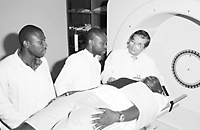
Nagata (right) giving guidance on patient restraints
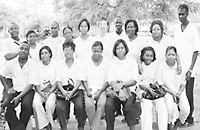
A breast cancer screening team from a local NGO. Workers participate from various hospitals. Nagata is in back row, center (Photo: Kosaku Nagata)

